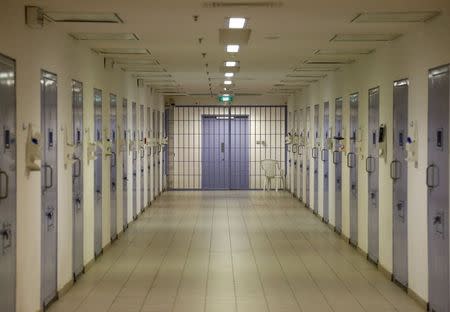Inside the Saudi prison that's home to new wave of jihadis
By Angus McDowall RIYADH (Reuters) - The man visible on the block's control room monitor, pacing his small cell in uniform grey robe, is one of a rising number of security prisoners in Saudi Arabia, where the wars in Syria and Iraq have led to a surge in domestic jihadist activity. Until last year, the population of inmates at security prisons like Ha'er, just south of Riyadh, had been dropping as those detained during an al Qaeda uprising a decade ago were gradually released. But as anger has grown in the kingdom over what many Saudis see as oppression of their fellow Sunnis in Iraq and Syria by Shi'ite Muslims, an increasing number of young Saudis have sworn to help by taking up arms themselves. As of March, nearly 2,300 Saudis had traveled to Syria to join jihadist groups like Islamic State and Nusra Front, according to the Saudi Interior Ministry. In recent months, fear has grown of attacks at home by Sunni militants on Saudi Arabia's own Shi'ite minority, found mainly in Eastern Province where much of the country's oil wealth is found. Islamic State has claimed responsibility for two attacks on Shi'ite mosques in eastern Saudi Arabia in May that killed 25 people. In the security prisons, the number of inmates had fallen by nearly 60 percent to just 2,289 in November 2013 from a high of 5,501 in December 2010. Today, there are 4,209 security prisoners, said Ha'er Prison's director, Colonel Mohammed "Abu Salman", who for security reasons preferred to give his nickname instead of a family name. Early last year the government, which backs the fight against Syria's President Bashar al-Assad but regards some of the jihadist groups in the opposition as a threat, decreed tough sentences for any citizens who joined the cause themselves. "I was just one of the young guys who went to fight. My cousin's mother was Syrian so I wanted to help," said a 25-year old with dark flowing hair and a cheerful face sitting up in bed in the prison's hospital wing. He was shot in the back by a sniper in Syria's Idlib province after spending two years with Nusra Front and is paralyzed from the waist down. Like other inmates, he was forbidden by the prison authorities from giving his name to visiting reporters. YOUNG FIGHTERS Many of the prisoners sitting on benches in an exercise yard, in the prison hospital, in the library or in shared cells, were young and fresh faced. They said they had gone to Syria by themselves after watching news reports and social media propaganda. One group, enjoying the night air in a courtyard with high walls and astroturf floor, included a 17-year old with braces still on his teeth and an 18-year old who had started traveling to Syria before changing his mind and turning himself in. Sitting with them was a slight, bearded 27-year old from al-Kharj, just south of Riyadh, who spent six months fighting with the Muhajirin, a jihadist group formerly associated with Islamic State. He chose to return because he was worried about his wife and daughters, and was arrested on arrival in Jeddah airport, he said. "It was news and videos online that convinced me to go to Syria. I went from Riyadh airport to Egypt and then, after three days, on to Istanbul. Then I flew to Hatta and the smugglers were waiting there at the airport, asking for money to take us across to Syria," he said. Another member of the group, who was older and smiled less, had spent 10 years in Afghanistan. He was from an earlier generation of Saudi militants whose motives also included a desire to help fellow Muslims, but whose goals were more explicitly anti-Western and rooted in religion. In a psychiatric clinic in the medical block, a handcuffed prisoner with white skull cap was from the same generation. He had spent 11 years in prison, convicted of terrorism, and had two still to serve. When he rose to shake hands, his skin was clammy and very cold. NEW TACTICS Unlike al Qaeda a decade ago, Islamic State does not have an elaborate network of members inside Saudi Arabia, said Mustafa Alani, a security analyst with close ties to the Saudi Interior Ministry. Instead it plans attacks, like the two May suicide bombings at Shi'ite mosques, from abroad and then communicates electronically with sympathizers inside the kingdom who provide logistical help to its few trained, committed operatives. The technique means attacks are less likely to come off because they rely on less-skilled people, but also makes it harder for the authorities to use arrests to roll up an entire group of militants, Alani said. Several of the bearded young men in the cell block were there not for trying to fight in Syria but for performing just such menial logistical assistance to fugitives or other suspected militants, such as giving them shelter or money. They are now used to the long prison corridors of grey tile and whitewashed walls, the pervasive smell of sweat and cleaning fluids and the food delivered in plastic wrappings through a slot in the cell door. After release from the prison, they will go through Saudi Arabia's militant rehabilitation program, courses with psychiatrists and religious sheikhs that starts within the security prison itself. Down another empty corridor a glimpse into one of the half dozen occupied interrogation cells showed a stocky, handcuffed man, his blindfold around his neck, waiting to be interviewed. For him, the gates of Ha'er prison are still opening. (Editing by William Maclean and Peter Graff)

 Yahoo News
Yahoo News 


